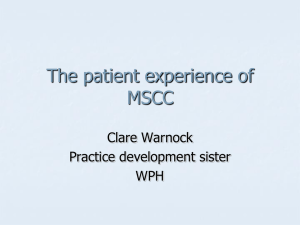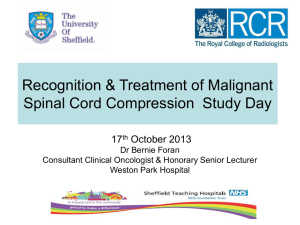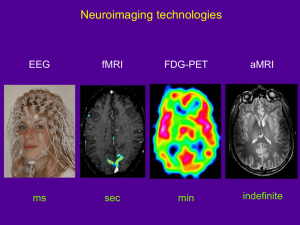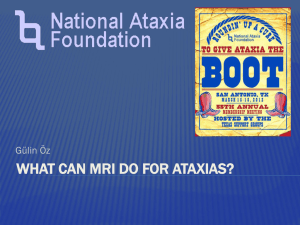YCN MSCC Pathway Implementation of NICE CG75
advertisement
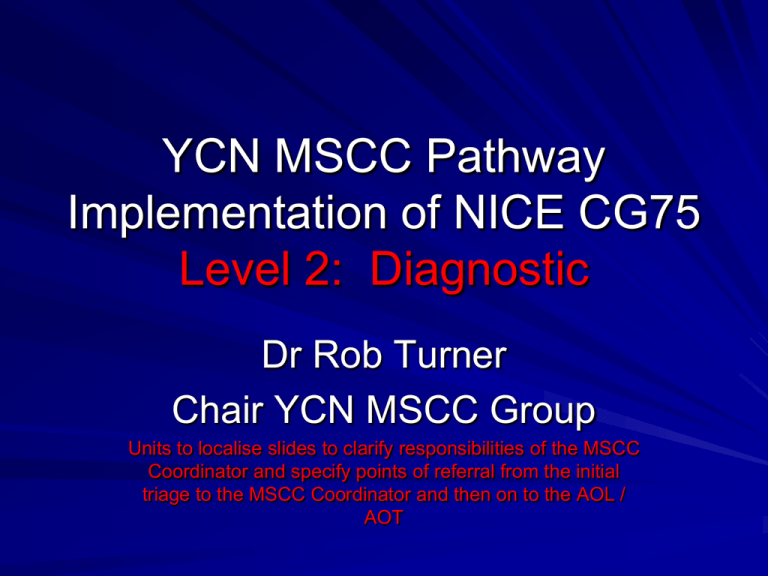
YCN MSCC Pathway Implementation of NICE CG75 Level 2: Diagnostic Dr Rob Turner Chair YCN MSCC Group Units to localise slides to clarify responsibilities of the MSCC Coordinator and specify points of referral from the initial triage to the MSCC Coordinator and then on to the AOL / AOT YCN MSCC Competency for Local MSCC Coordinators Local Acute Oncology Team MSCC Coordinators Competency a)Knowledge and understanding of which patient groups are at a higher risk of developing MSCC b)Knowledge and Understanding of the signs and symptoms of MSCC c)Understanding of the appropriate aspects of the MSCC pathway a) b) c) d) Escalation to the local coordinator Escalation to investigation Referral process to Leeds Specialist MSCC coordinators – assessment and referral for treatment d) Knowledge and understanding of the MSCC treatment options and specialist service processes for delivering treatment Education E - Learning Level 1- Early Warning Level 2 – Diagnostic YCN MSCC Pathway Components of the pathway Overall goals YCN implementation of the Guideline SJIO implementation of the Guideline Future developments MSCC Pathway Components 1. 2. 3. 4. Education and early warning Triage Diagnosis & generic care Specialist intervention Spinal surgery Radiotherapy 5. Rehabilitation Overall goals Earlier diagnosis and treatment – Outcomes linked to pre-treatment status Faster access to diagnostic MRI – Suspected MSCC within 24 hours VBM within 7 days Rapid escalation to definitive therapy – Proven MSCC within 24 hours VBM within 7 days Definitive therapy case-appropriate Co-ordinated case-appropriate rehab YCN implementation of the Guideline Devolved responsibilities – Cancer Unit AOTs Early warning Triage Diagnostics and generic care Rehabilitation – Centre MSCC senior medical advisors – Spinal surgery – Radiotherapy SJIO implementation of the Guideline Must work both as Cancer Unit and Centre SJIO implementation of the Guideline Cancer Unit – ALL MEDICAL STAFF – In- and out-patients – Leeds based Breast Lung Urology Colorectal Haematological – Centre-based MDTs Under active review Cancer Centre – CLINICAL ONCOLOGY ONCALL TEAM – Proven MSCC only Imaged – Reported – Transferred Education and early warning High-risk patient groups – Agreed by YCN SSG Chairs Face-to-face discussion Common format patient information – Symptoms of MSCC and VBM – Instructions about action to take (add local process) 24 hour SINGLE POINT CONTACT NUMBER Add Local Number High Risk Patient Groups Any patient who has had prior MSCC Any patient with known bony metastases at any site from any primary site Known cancer awaiting investigation for suspicious spinal pain Tumour site-specific recommendations – – – – – Prostate: Renal: Lung: Breast: Myeloma: HRPC Metastatic renal cell cancer Any metastatic lung cancer Any metastatic breast cancer Any myeloma MSCC symptoms & signs Triage: Mechanism Nursing staff will take basic details Escalated to Local Details In hours to be handled immediately – Overnight (22.30-09.00) defer until handover On-call Local team to triage – Ring back for more detail Priority – Immediate or deferred? Ward or clinic for clinical assessment – Is MRI required and how quickly? Triage: Need for MRI Probability MRI shows neural compression (after Lu, J Sup Care 2005;3:305-312) Neurological deficit Present Absent High-risk & suspicious pain 81% 69% Suspicious pain only 44% 33% Triage: Endpoints MSCC possible – Urgent clinical assessment – Urgent in-patent MRI (within 24 hours) Admission may be required – You MUST discuss with a Consultant CO MSCC less likely but VBM possible – Prompt outpatient assessment – Prompt outpatient MRI (within 7 days) MRI Whole spine MRI imaging – MSCC (Rx within 24 hours) With/without features of spinal instability – Non-compressive VBM (Rx within 7 days) – Off-pathway findings Non-malignant neural compression Non-malignant spinal disease YCN radiology group have agreed – YOU WILL NEED TO DISCUSS WITH A RADIOLOGIST FACE-TO-FACE Caveat If you are an oncologist but not part of the on-call CO team and you are concerned about MSCC or VBM do not delay the process by ringing ward 96 or the CO oncall team: Arrange a whole spine MRI and escalate the result Diagnostics and generic care Whole spine MRI is gold-standard – CT or isotope bone scan is not In all cases – Analgesia In suspected MSCC – DEXAMETHASONE 16mg od plus H2RB/PPI – Thromboprophylaxis – Encourage mobilisation Mobilisation & suspected MSCC Flat bed-rest is not the default – Position/mobilise as pain permits Lying Inclined sit Sitting balance Assisted transfer Independent transfer Assisted mobility Independent mobility Specialist Intervention All MRI proven MSCC should be escalated to Leeds - the CO StR on-call – Agreed YCN access-point to therapy – Spinal surgery should NOT be approached directly for MSCC cases – The need for a spinal surgical review will be established according to agreed criteria by the Leeds CO team Specialist Intervention Key steps – Confirm diagnostic criteria are met – Establish fitness for transfer/treatment – Establish most appropriate intervention – Escalate for surgical opinion if indicated – Transfer if not already at SJIO – Deliver definitive therapy – Initiate rehabilitation process Confirm diagnosis MSCC is not MSCC until – There image proven neural compression Images are reported Images and report are available – The malignant diagnosis is not in doubt Confirm diagnosis: Issues No MRI – Unit has responsibility to perform imaging If no MRI service available – Establish name of unit radiologist who has sanctioned the need for an MRI but agrees no facility to scan – Establish fitness to transfer – Transfer to SJIO for MRI imaging MRI but no report – Establish name of unit radiologist who has sanctioned the need for an MRI but is unable to report – Ask referring unit to transfer images – Discuss with SJIO radiology on-call Confirm diagnosis: Issues No malignant histology – Clinical context History, examination – Radiological context Oligometastatic or multi-level Simple imaging CT imaging – If the diagnosis is in doubt and there is either no clear candidate primary or target for biopsy (that would not be within the RT field) Needs surgical intervention for decompression and tissue – Unless PS/co-morbidity preclude Establish fitness Do not transfer if – Against patient’s wishes – Medically unstable – Established paresis >48 hours and no pain Treat as day-case if – Ambulant – Self-caring/self-medicating Discuss with PR/RTBO if – Single fraction proposed – Nurse escort available Other cases to transfer into Bexley Wing Bed – Same priority as neutropenic – Patient to be at Bexley Wing to enable RT simulation by 12.00 – Referring hospital to hold bed pending transfer back Establish most appropriate intervention See EQMS Radiotherapy – Radiotherapy quality system Radiotherapy protocols – Palliative MSCC_Palliative_RTAlone_Unplanned Escalate for surgical opinion if indicated – Units to escalate to the Leeds StR as Guidelines Escalation based upon – Co-morbidity/fitness – Presence or possible mechanical instability Radiological Clinical – Cancer survival estimate – Surgical risk factors Seeking a surgical opinion – responsibility of Leeds Confirm appropriate with CO consultant Access spinal surgical consultant direct – Up to date mobile numbers are available Above D2: neurosurgical Below D2: spinal orthopaedics – DO NOT use neuro/ortho StR Request image review via PACS If operable they will take to LGI – Possible return to RT if patient declines risk or if not appropriate after face-to-face review Surgical opinion: Issues Missing data for prognostic tools – Calculate maximum possible score based upon data available If missing data critical: defer Rx until available No surgeon available and opportunity loss high – RT possibly inferior Retained ambulatory function Long anticipated OS (TPS >12) Low-risk surgical candidate – Liase with Sheffield or Hull – Maintain on DEX with regular (twice daily) review with default to RT if deteriorates Deliver definitive therapy – patient admitted to Leeds Submit RT e-booking form via Mosaiq – Palliative Spine Speak to booking office to establish time Liaise with bed coordinator/PR suite – Patient must be simulated before 13.00 – Liaise with on-call radiographers if w/end Initiate rehabilitation process As part of informed consent, discuss and document in case-notes – Goals of treatment Anticipated ambulatory function post treatment Time-scales for recovery – Likely trajectory of underlying malignancy Fitness for further anticancer therapy Fitness for active rehabilitation This will make onward support from AHPs much more straightforward Do not forget Tail-off DEXAMETHASONE – Tumour may ‘flare’ so Delay until 3-5 days post initial RT # Reduce by 4mg every 3-5 days Step up if neurology worsens after initial recovery Dictate a prompt transfer/discharge summary via PPM Arrange appropriate f/up – No f/up is not appropriate If not your team, then who is taking over? Future developments Faxable referral/transfer proformas Framework for rapid handling of VBM Spinal MDT – Surgical cases for adjuvant RT – Non-compressive VBM for surgery Access to newer technologies – Minimally invasive techniques Faster recovery for less fit patients SBRT for spinal metastases Feedback from Peer Review mandatory audit
